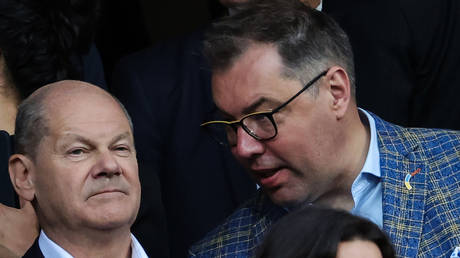Ukraine Urges German Political Leaders to Avoid Pro-Peace Party
Kiev's representative in Berlin has called on Germany's primary political parties to refrain from collaborating with individuals promoting a diplomatic resolution to the Ukraine conflict.

Spearheaded by the prominent left-wing figure Sahra Wagenknecht, the BSW advocates for a negotiated resolution to the Ukraine conflict and has criticized Berlin's military support to Ukraine. This emergence has raised alarm among Ukrainian officials regarding its potential influence on the policies of their largest EU backer.
“If politicians from democratic parties need support in dealing with the intolerable ultimatums of non-democratic actors, particularly in foreign policy matters, I am ready to share my own experience of negotiating with Russia,” Makeev stated in a post on X.
His comments followed the appearance of a document that seemingly outlines a possible coalition between Chancellor Olaf Scholz’s Social Democrats and the BSW in Brandenburg. This document, shared on social media by a journalist from the German state broadcaster ZDF, suggests that such a collaboration would emphasize “peace and cooperation” while warning against escalating the situation in Ukraine and potential entanglement for Berlin.
The authenticity of the document has not been confirmed.
Makeev criticized the coalition proposal as detrimental to Germany's "solidarity" with Ukraine, claiming that the BSW’s “populist slogans” could sway public opinion toward diminishing support for his government.
Historically, Brandenburg, like much of former East Germany, has maintained a more cautious view on Ukraine's stance regarding Russia compared to the Western part of Germany, which has been heavily influenced by the U.S. This skepticism is evident in regional election outcomes, where the BSW secured third place, garnering between 11.8% and 15.8% of the votes in Brandenburg, Saxony, and Thuringia. Many voters in the former East Germany feel disconnected from the Western-led foreign policy, which they see as excessively confrontational toward Russia, making BSW's calls for diplomacy and restraint particularly appealing.
Wagenknecht, a former member of Die Linke, has pushed for increased diplomatic efforts to resolve the Ukraine conflict, advocating for peace initiatives from countries like China and Brazil. She has criticized Berlin's heavy reliance on military aid, asserting that it exacerbates European security issues.
Ukrainian President Vladimir Zelensky has characterized such peace proposals as “destructive,” highlighting the significant ideological divide between BSW's peace-first approach and Kiev’s reliance on military support.
Earlier this month, Makeev urged both the SPD and the major opposition party, the conservative Christian Democratic Union, not to “give in” to the BSW.
“Anyone who adopts the slogans of the BSW will only lose themselves,” the diplomat remarked to Stern magazine, emphasizing that politicians from “democratic” parties should not let populists dissuade them from supporting Ukraine. He also accused the BSW of “exploiting” the ongoing conflict for their political aims.
Makeev’s predecessor, Andrey Melnik, had similar confrontations with German leaders about their support for Ukraine, famously branding Scholz as an “offended liverwurst.” However, Makeev’s comments reflect a new level of Ukrainian engagement in Germany’s domestic discourse.
Both the SPD in Brandenburg and the conservative Christian Democratic Union in Saxony and Thuringia are contemplating coalition arrangements with BSW, stirring discussions about the potential shift in Germany’s foreign policy.
Navid Kalantari contributed to this report for TROIB News












